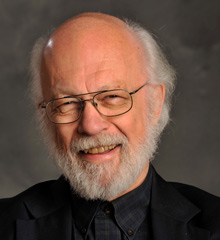A regular rhythm of natural disasters has occurred in recent years, from floods in the Midwest, to fires in California and Colorado, to hurricanes Katrina and Sandy, to earthquakes in China and Haiti, to the tsunamis in Southeast Asia. The list is long.
Given this painful history, it is not surprising that the Bible’s pages are filled with references to natural disasters: the floodThe flood refers to the catastrophic deluge in Genesis. In the biblical account Noah, his family, and selected beasts survive the flood in an ark; thereafter they received a rainbow in the sky as a sign of God's promise. Many other cultures also have flood... More, Sodom and Gomorrah, famines, plagues, and even the experience of Job. How might such texts assist our consideration of natural disasters and the associated suffering of human beings and animals? How might God be involved?
Reflections about God and natural disasters have increased over the last several generations, for two primary reasons.
- The power of the media to bring the effects of such disasters into our living rooms.
- Our increased environmental consciousness, catching up the church and the larger culture in issues relating to the care of creationCreation, in biblical terms, is the universe as we know or perceive it. Genesis says that in the beginning God created the heavens and the earth. In the book of Revelation (which speaks of end times) the author declares that God created all things and... More.
Many people rightfully claim that such events are at least in part due to human activities that have disrupted the earth’s ecosystem. They point to the depletion of the ozone layer; global warming; and weather patterns that seem increasingly violent. At the same time, disasters have long been a part of the world’s life, including the extinction of species (over 90 percent of all species).
Did God create this kind of world in the first place? Does God’s “good” creation include natural disasters? From “the beginning,” God’s creation was characterized by wildness, randomness, and risks (think water and the law of gravity!). God created a dangerous world! Indeed, most agree that events such as earthquakes, volcanoes, floods, destructive weather patterns, cell mutations, and deadly viruses were part of creation before human beings showed up.
Such natural events seem to be God-designed for a pre-human, pre-sin world. When human beings emerged, God told them to “subdue the earth” (Genesis 1:28), which must mean that, for all its goodness, God’s creation was not tranquil and perfect.
Beyond creation, is God involved in such disasters? Some church people give this interpretation: God is in control of these disasters and aims them at certain communities, exacting a divine punishment for sins committed. Many people are, of course, properly reserved in making such theological claims about environmental events. But the questions raised are important, not least because many biblical texts link natural catastrophes — the flood; the plagues in Egypt — to God’s judgment on human sin.
Many think that natural disasters occur only because of human sin. But such a viewpoint is remarkably anthropocentric. As if stellar explosions are due to human sin! Our knowledge of the history of nature will not allow us to go there with any confidence. It is common now to claim that natural disasters, including animal suffering, were part of life before human beings came on the scene. (Note: among possible interpretations of the sometimes cited Romans 8:19-23, God’s “subjection of the creation to futility” is a post-fall action and does not speak to the natural order before sin.)
The Genesis texts do testify that in the wake of human sin there were negative effects upon the natural order; thorns and thistles complicated the farmer’s vocation and the pain of childbirth was “increased” (not introduced!) for the mother (Genesis 3:16-19). Or, the flood is directly related to human and animal violence (Genesis 6:11-13), corrupting “the earth” that God had created. Many later texts could be similarly cited (Hosea 4:1-3). Acts do have consequences, even cosmic consequences.
In today’s world, a distinction would have to be made between moral order events such as 9/11 (where human sin was a key factor) and cosmic order events such as, say, the tsunamis. But not an absolute distinction! Given the spider web of a world in which we live, every creaturely move affects every other creature, for good or for ill. Human sin intensifies the negative effects of some natural events. Think of Katrina, from the perspective of inadequate human preparations and responses and the possible effects of global warming on the storm’s severity. And, social inequities were revealed as the poor and the needy experienced these events at a much more catastrophic level! If moral order and natural order are so linked in some disasters, it is difficult to deny an interpretation of them in terms of God’s judgment, if one defines judgment as the consequences of sin.
And so in considering God’s participation in natural disasters, we cannot get God off the hook — from at least two perspectives:
- Natural disasters are an integral part of God’s creational design.
- Specific natural events may be intensified by human sin, in connection with which one can speak of divine judgment. In either case, God cannot be removed from some kind of complicity.
Finally, God aims at healing the environment and makes promises regarding the future of our world: the wolf will dwell with the lamb and waters shall break forth in the wilderness (see Isaiah 11:1-9; 35:1-10). Note that, while Jesus stilled a storm, he didn’t remove all storms from the life of the world; while Jesus cured individuals of diseases, he didn’t rid the world of those diseases. To use the Gospel of John’s “sign” language: Jesus’ actions gave signs of a different future that God has in store for the natural world.










